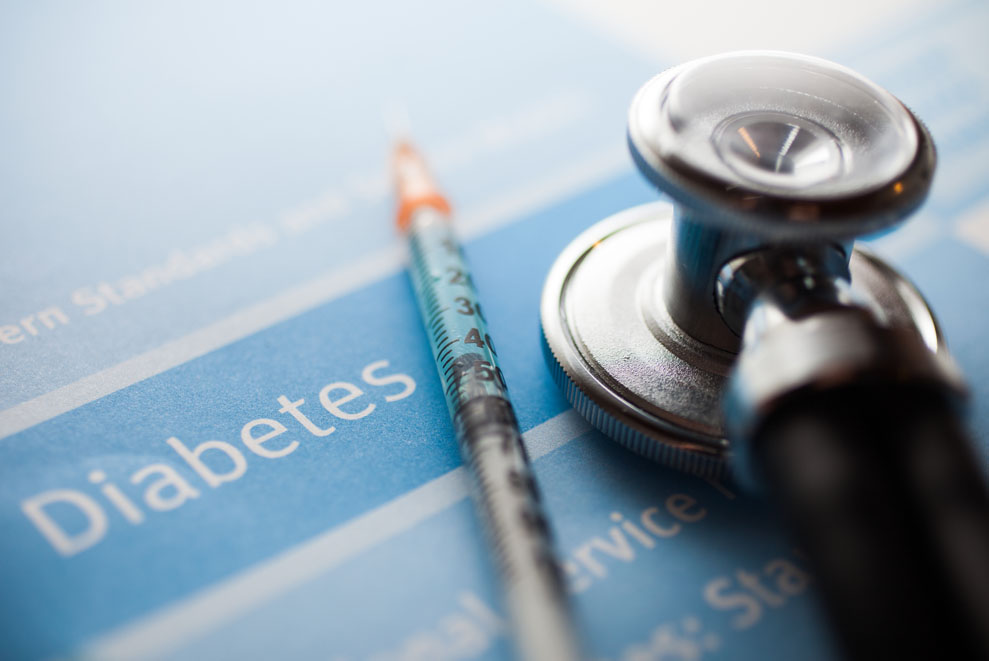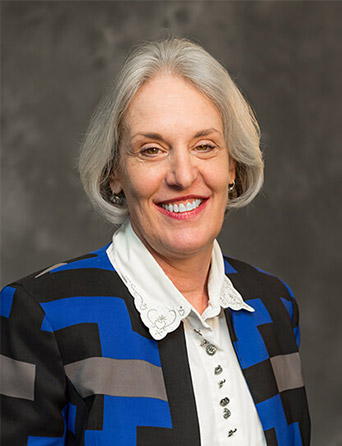

Diabetes Care
Get expert help to take charge of your diabetes.
Medical Services and Specialties
Almost everyone knows someone who has been diagnosed with diabetes. In fact, an estimated 25 million children and adults in the United States have diabetes, and this number is rapidly growing with two million new cases each year.
The increasing trend in the onset of diabetes –particularly Type 2 diabetes – is due to several factors, ranging from genetics to daily lifestyle choices. Diabetes is a major health problem worldwide. The best way to understand diabetes is to educate yourself on the different types and risks associated with this chronic disease.
Schedule an Appointment
What Is Diabetes?

To begin to understand diabetes, it's important to know how your body processes food to be used for energy. During digestion, food is broken down into tiny components that include sugar (glucose). The pancreas, an organ near the stomach, produces a hormone called insulin. Insulin is responsible for facilitating glucose getting from the bloodstream into the body's cells. This hormone is necessary because glucose is the basic fuel for the cells in the body.
If the body isn't making enough insulin to keep up with the amount of glucose in your bloodstream, or if the body is having trouble making its own insulin, blood sugar may rise to dangerous levels. Over time, high blood sugar levels can lead to the onset of diabetes and more serious health problems.
Types of Diabetes
Diabetes includes two main types: Type 1 and Type 2. In addition to these types, there are two potentially reversible diabetes conditions known as prediabetes and gestational diabetes. Whatever type you have ultimately means there's too much sugar in your bloodstream.
Type 1 Diabetes
Type 1 diabetes is usually diagnosed in children and young adults. It's a serious condition that occurs when the pancreas makes little or no insulin. A person with Type 1 diabetes needs insulin injections to survive and will need to work closely with a diabetes care team to monitor glucose levels and learn proper insulin management.
Type 2 Diabetes
Type 2 diabetes is the most common form of diabetes and is typically diagnosed in middle-aged adults. Although their bodies still make insulin, it doesn't work as it should. This is also known as insulin resistance. Type 2 diabetes occurs often in people who are overweight and live inactive lifestyles, but it can also occur for other medical reasons.
Prediabetes
Prediabetes means the body is having trouble getting blood sugar levels down to a healthy range. This also means that without making some healthy lifestyle changes, the body will most likely develop diabetes.
Gestational Diabetes
Gestational diabetes is the development of diabetes during pregnancy due to an abnormally high amount of sugar in the mother's bloodstream. Most women with gestational diabetes don't remain diabetic after the baby is born. However, a woman who has had gestational diabetes is at higher risk for developing it again during a future pregnancy and for developing Type 2 diabetes later in life.
Take Charge of Your Diabetes
Kelsey-Seybold offers outstanding educational opportunities to help you manage your diabetes. We have certified diabetes care and education specialists (CDCESs) and registered dietitians (RDs) who will help you manage your diabetes and stay motivated to live a healthier lifestyle.
Who Is at High Risk for Diabetes?
You may be at greater risk to develop diabetes if:
- You are over age 45.
- You developed gestational diabetes or gave birth to a baby that was over nine pounds.
- You lead a sedentary lifestyle.
- You are overweight or obese.
- You have a family history of diabetes.
- You are an African American, Hispanic, Native American, or Asian American.
- You have prediabetes.

Education
At Kelsey-Seybold Clinic, our goal is to not just treat your diabetes, but to also provide you with the information, motivation, and support you need to manage your condition and lead a healthier lifestyle. That’s why our care doesn’t begin and end with doctor visits. We also offer education and personalized lifestyle guidance.
Certified Diabetes Care and Education Specialists
Certified diabetes care and education specialists (CDCESs) specialize in education and management of diabetes and are available to provide individualized counseling.
Ann Young, RN, CDE

Ann Young is a registered nurse and a certified diabetes care and education specialist. She has been with Kelsey-Seybold Clinic since 2000 and has more than 30 years of experience in diabetes education. Ann is passionate about helping patients understand their diabetes and how to manage it. She is available to provide individualized counseling to help you manage your diabetes and improve your quality of life.
Who’s Eligible for These Services?
- All HMOs cover diabetes education by certified diabetes care and education specialists and visits with registered dietitians. A co-pay, which varies by health plan, is required for each Diabetes Education Class.
- PPO and POS coverage varies. It's important to ask your insurance company what’s covered under your plan.
- KelseyCare Advantage and Texan Plus pay for diabetes education by certified diabetes care and education specialists and visits with registered dietitians. Some plans might require a co-pay or patient financial responsibility.
Appointment Scheduling
For additional information about our diabetes education programs, call 713-442-6330. To schedule an appointment with a Kelsey-Seybold certified diabetes care and education specialist or a registered dietitian, use your MyKelseyOnline account or call our 24/7 Contact Center at 832-266-0676.
Prevention
When it comes to Type 2 diabetes — the most common type of diabetes — prevention is crucial, especially if you're at increased risk. If you’re overweight, have a family history of diabetes, or are African American, then you have a greater chance of developing diabetes.
Making a few basic lifestyle changes now may help you avoid the serious health complications of diabetes later, such as nerve, kidney, and heart damage. Preventing Type 2 diabetes can be as simple as eating more healthfully, being more physically active, and shedding a few extra pounds.
Prevention tips from the American Diabetes Association and your Kelsey-Seybold doctors include the following.
Get More Exercise
Exercise can help you lose weight, lower your blood sugar, and boost your sensitivity to insulin, which helps maintain your blood sugar within a normal range. A fitness program that incorporates both aerobic exercise and resistance training can help control diabetes.
Eat Fiber-Rich Foods
These include fruits, vegetables, beans, whole grains, nuts, and seeds. Doing so may help you reduce your risk of diabetes, lower your risk of heart disease, and promote weight loss by helping you feel full.
Eat Whole Grains
Set a goal of making at least half your dietary grains whole grains. Whole grains in breads, pasta products, and cereals may reduce your risk of diabetes and help maintain blood sugar levels. Check for the word "whole" on the package and in the first few listed ingredients on the label.
Lose Excess Weight
Every pound you lose can improve your health and reduce your chance of developing diabetes.
Avoid Fad Diets
Instead of fads that typically only produce temporary results, focus on variety and portion control as part of an overall healthy eating plan.
Get Regular Checkups
Your doctor is your best resource and champion when it comes to disease prevention. They may have additional tips based on your medical history and other factors.
Our Diabetes Care Team
Although being diagnosed with diabetes can be overwhelming, Kelsey-Seybold wants to help you get started on a path toward improving your health each day. Quality diabetes care involves more than just your primary care physician. It takes the comprehensive care of your primary care physician, registered dietitian, and, in some cases, an endocrinologists all working together.
The National Committee for Quality Assurance (NCQA) and the American Diabetes Association (ADA) have recognized many of our primary care physicians and specialists for providing exceptional care for diabetic patients through the NCQA’s Diabetes Recognition Program (DRP). In fact, Kelsey-Seybold’s NCQA-certified physicians represent the most of any healthcare provider in the Houston area.
Achieving recognition through the NCQA is a major accomplishment for a physician. Only those who follow the NCQA guidelines, participate in a rigorous on-site review of key clinical and administrative processes, and show measurably outstanding clinical practices with their patients qualify for NCQA recognition. Diabetic patients who receive care in keeping with these measures are less likely to suffer complications of diabetes such as heart attacks, stroke, kidney disease, blindness, and amputations.
Registered Dietitians
Also available for one-on-one consultation are our registered dietitians (RDs). These healthcare professionals provide individualized nutritional counseling. They’re a key part of your diabetes management and help you determine your food needs based on your weight, lifestyle, medication, and other health goals To schedule an appointment, call our 24/7 Contact Center at 832-266-0676.
Frequently Asked Questions
-
What is diabetes?
-
Is diabetes dangerous?
-
What is prediabetes?
-
What are the types of diabetes?
-
Who's at a high risk for diabetes?
-
What are the symptoms of diabetes?
-
Does diabetes contribute to other health problems?
-
Can diabetes be prevented?
-
Can diabetes be reversed?
-
How will I know for sure if I have diabetes?
-
Can diabetes be cured?
-
How is diabetes managed?
Videos

Schedule an Appointment Today!
You can book appointments through our secure online patient portal, or call our 24/7 Contact Center.
